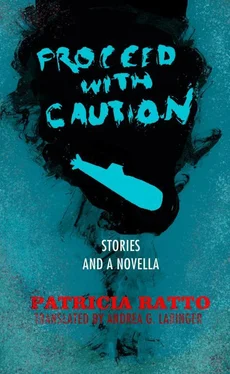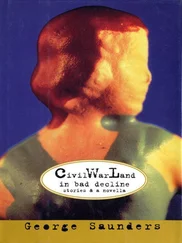I’ve just finished my shift and leave the engine room for my bunk. On the way there I see the CO walking from the first periscope to his cabin. I take a few steps down the narrow passageway behind him, and when he reaches his cabin he suddenly turns around to go back the way he came. I stand aside to let him pass and take up my course again. I watch him go back and see that when he reaches the first periscope, he turns again to return to his cabin. I lower my eyes; it makes me uncomfortable to think that he may have caught me watching him, and so I continue walking toward the bunks as the CO once more arrives at his cabin, no doubt with the intention of turning yet again and walking back to the periscope. Standing in front of my bed, I discover that someone is lying in it. That happens sometimes, so I climb up to the top one, which is empty. Meanwhile I see Soria arrive, climb up, and collapse in his own bunk, at the same level as the one I’m in now, but on the opposite side of the passageway. I rearrange the pillow and lie down. Soria lies down too, and now he stretches his arm up in the air. There must be some 40 centimeters between him and the ceiling; everything is narrow here, compressed, and he’s passing his hand over the little photo he had placed in the slot. Forty centimeters to the ceiling, and then, tons of icy water, tons of ocean above my head, above the heads of the others, above the head of the CO as he comes and goes from the first periscope to his cabin and from his cabin to the first periscope, everyone under tons of water. I never stopped to think about this in spite of all the time I’ve been a submariner, never until now, maybe because now everything seems to be different. So much endless water out there, so many things together in the narrow space of this tube. The fluorescent lights go out, the night navigation lights go on. If not for that, it would be impossible to tell: there’s no day or night in here.
The little black curtain of the bunk beneath Soria’s moves: someone is opening it, he stands up and consults his watch: it’s Heredia, it must be time for his shift, they’re probably going to take advantage of the night to rise to snorkel altitude and do the venting. Heredia climbs out of his bunk, straightens the sheets a little, zips the case shut to cover everything, picks up the crate of apples that’s sitting on the lower bunk and places it on his bunk. For a moment he stands there looking at the fruit, and so do I, some of them wrapped in delicate, purple paper, others unwrapped, red and shiny, crossed by a few green streaks. And Heredia emerges slowly, walking toward the torpedo area. Apples, apples, one on top of another, next to one another, under one another, apples in an apple crate. We’re rising now; I can feel it in my body. Besides, the apple crate has slid a few centimeters sternward.
They’re playing truco on the aft table. Almaraz is writing in his little black notebook again, someone is drinking coffee, Polski smiles as he draws a cartoon of one of us on a piece of paper with the shield of the Argentine Navy. I pass behind the benches, circling around them, and suddenly I think I see—underneath the curtain separating the table from the bunks at stern, which we call the red light district—the tips of my boots. I think they’re my boots because one of them has a small, dark, curved nick at the tip, which I made some time ago. I don’t say anything. Either someone is playing a gag on me or else I must have left them there by mistake, because it was in this section that I fell asleep during the previous campaign. And yet I remember looking for them and not seeing them. Or maybe I just think I looked for them, but I only meant to, I don’t know: lately I’ve been getting things mixed up; it’s as if facts and thoughts have the same weight, as if everything is consistent, but at the same time slippery. No matter: just in case this was only a gag, I carefully pick up the boots and don’t say anything; once more I pass behind the card players and silently walk back to my bunk, placing them on top of it—resting against one of the edges of the bed—and I cover them with the blanket I sometimes use to cover my feet.
For a few days now we’ve had a certain noise; it comes from above, probably from someplace between the hull and the deck. When the sub rolls, the noise begins: taka-taka-taka, taka-taka-taka, tak, and then taka-taka-taka, taka-taka-taka, but we don’t know what causes it. Then it suddenly disappears and we don’t hear it again and we go on doing our usual thing. Today is clothes-changing day, and since we need to save water, the clothes aren’t washed, so all of us put our dirty stuff in a bag and someone adds rocks, too, the rocks that were loaded on board specifically to act as ballast when they throw the filled bags out the garbage ejector at the stern. Nobody wants them to float to the top for the Brits to discover, so that’s why the rocks, to leave our dirty rags at the bottom of the sea. Taka-taka-taka, taka-taka-taka, here comes the noise again. I hope someone will decide to do something, though surfacing at a time like this would mean revealing our presence, taka-taka-taka, taka-taka-taka-tak. The noise, that noise—sooner or later it’s going to give us away.
I watch Soria and Torres work; for days now they’ve been wearing their life jackets all the time. A submariner’s life jacket has its special features: an inflatable part that goes around the neck, and on the chest a metal sheet under which there’s a bottle with gas that’s used to fill up the inflatable part, in addition to a series of straps and loops to adjust it to the body. Well, it’s obvious this isn’t exactly the most comfortable thing in the world. All day and all night Torres and Soria wear their life jackets for doing their work as machinists, for eating, for sleeping, for taking a shit. They’re afraid, though if not for the life jackets, nobody would notice their fear because they keep doing what they have to do like the rest of us. Now they’re calling us to our stations; it’s a drill so that we’ll be prepared in case the day comes when we really do have to man the battle stations. I see Olivero pass behind Marini, who’s standing in front of the fire control computer; Olivero advances, his head hanging, maybe as a precaution to avoid exchanging looks with Marini in case he should accidentally turn around. Ever since we started the campaign they haven’t been talking to each other; they were always good friends, but now they avoid one another all the time. Something must have happened between them. Marini sits down in the computer operator’s seat; we all occupy our stations, Torres and Soria with their life jackets on their backs. The tension has grown, you can tell by certain gestures; I, on the other hand, feel fairly calm even though I can’t really explain why.
Beards have grown, nobody shaves; we’re surrounded by water but there is no water, not for shaving; there’s no reason to shave, either, no motivation, no one to do it for. That’s why they all go around scratching themselves; a beard itches when it starts to grow, it itches a lot for a few days; later you get used to it and the hair grows and stops itching. That time will come soon, and by then we’ll surely have our hands—and our minds—busy with other things. All of us bearded, except Soria, who’s too young, so young that his whiskers haven’t even started to grow yet.
A muffled sneeze, barely audible, though there are two or three guys with colds, since it’s very cold in here. Judging from the nearness of the sound, I imagine it must be Cuéllar. I poke my head out of the engine room; Cuéllar blows his nose gently to avoid making noise, Medrano, who’s sitting in front of the sonar, gestures, and Cuéllar approaches, Medrano whispers something to him and hands him his earphones, Cuéllar puts them on, listens attentively for a few moments, nods, returns the earphones to Medrano, and while Medrano continues to listen, Cuéllar takes broad, but quiet, steps toward the control room and explains something to the communications officer; he must have told him they’ve detected noise on the hydrophones because immediately they call us to our battle stations, and so I return to the engine room. We’re in a permanent safe zone, in our patrol area, just one hundred miles from the exclusion zone, and we all know that this is no drill: for the first time in our lives, this call to the battle stations is absolutely real. Maybe it’s a sub, says Soria, huddled in his life jacket; it has to be English if it’s circling around here, Torres adds from inside his; none of our ships are in this zone. I look out toward the sonar section and see Medrano making signs. Then someone turns off the fans to eliminate even the tiniest sound, and suddenly there’s a void that seems to be sucking up everything except this new deep, desperate silence. Possibly a freighter, Medrano whispers to the communications officer. All of us standing close enough to hear look at one another; no one utters a word, no one moves. Cuéllar presses his handkerchief to his nose; a sneeze right now would be unfortunate. Soria adjusts the buckles on his life jacket, Torres copies his movements, I stare at the black grease stains on the toes of my socks. Almaraz directs his gaze to the oxygen meter, Polski grips the horizontal rudder he’s operating. Freighter withdrawing, sir, Medrano announces—in a soft, but confident voice—a few eternal seconds later. We breathe, we calm down, though just a little because we remain in silence, a cautious, superstitious silence, till Medrano confirms that the sounds on the hydrophone have stopped. Not until then do we take a deep breath, our bodies loosen up, our faces relax. The cook brings coffee to the sonar technicians, saying have some coffee, boys, and he hands over the two pitchers with a smile. Medrano and Cuéllar thank him, look at one another, clink the pitchers together, satisfied, toasting, and we all begin to move around, each one doing his own thing, nothing happened, not this time. The nurse comes by with his first aid kit; I follow him with my eyes to see what’s going on. Nothing, apparently; he chats with the Executive Officer, who gets up from his chair at the control table and heads for the officers’ cabins, followed by the nurse. I decide to go back to my bunk for a handkerchief, I think I may have caught cold, too; when I pass by the officers’ cabins, the half-open door allows me to see that the Executive Officer has removed his right sock, and he’s having another treatment. I continue on my way to my bunk to get the handkerchief and I see that my boots have disappeared; the blanket I use to cover my feet is neatly folded, just like the day we set sail and I made my bed, folded in thirds in that special way I do it, just as if the boots had never been there. I run my hand over it to make sure of what at first glance seems obvious, confirming their absence. I can’t try to look for them now; it’s my shift in the engine room, I’ll do it when I’m done. I take the handkerchief I keep under the pillow, it’s damp but I blow my nose anyway, I adjust the pillow, which also feels damp, the sheets are damp, the blankets are damp, the towels, clothing, socks, skin, tools, the dry crackers, everything’s damp in here. I stick the handkerchief in my pocket and walk to my post next to the engines; I cross paths with the nurse, who has finished the Executive Officer’s treatment and is now on his way to the galley. Someone asks Almaraz about the pain in his chest. Almaraz replies that the pain has gone away and that he feels okay. I continue on my way to the engine room; a drop suddenly falls on the middle of my head from a manifold above: even our breath condenses and rains down on us. When I pass by the control room, someone mentions that there are problems with the fire control computer; I see an officer sitting next to Marini, both of them at the keyboard. I pass through the control compartment, arrive at the engine room. Soria looks at me without seeing me; a heavy, slow drop of water breaks off from the lower buckle of his life jacket and starts to fall and will keep on falling till it bursts, if nobody gets in its way, right on the tip of the sock on his right foot.
Читать дальше












